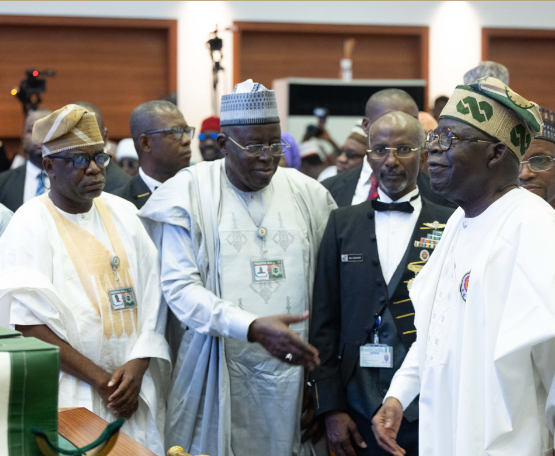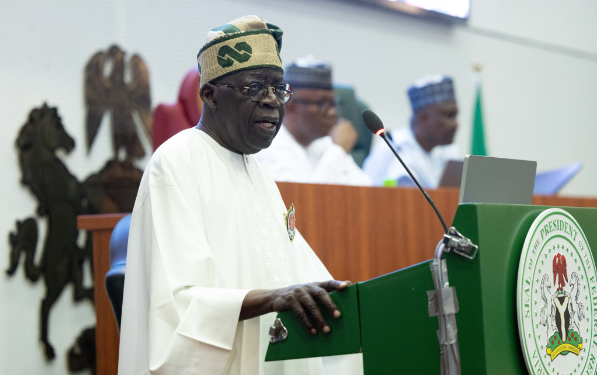President Bola Tinubu on Wednesday presented the 2024 appropriation bill to the National Assembly which he called the ‘Budget of Renewed Hope.’
Recall that on Monday the Federal Executive Council (FEC) approved the sum of N27.5 trillion for the 2024 budget.
The federal government said is targeting an N18.32 trillion revenue generation to fund the budget, leaving the projected budget deficit at N9.18 trillion.
The President also stated on Wednesday that he projected that the economy would grow by an impressive 3.76% in the 2024 fiscal year.
The recurrent expenditure in the bill is set to gulp N9.92 trillion while capital expenditure is N8.7 trillion.

What the President said
Addressing the National Assembly on the 2024 budget proposal, President Tinubu announced plans for a comprehensive overhaul of the internal security architecture. The objective is to strengthen law enforcement capabilities, fostering the protection of lives, property, and investments across the country.
The proposed budget places significant importance on human capital development, with a specific emphasis on school children.
- “We expect the economy to grow by a minimum of 3.76 percent, above the forecasted world average. Inflation is expected to moderate to 21.4 percent in 2024. In preparing the 2024 Budget, our primary objective has been to sustain our robust foundation for sustainable economic development. A critical focus of this budget and the medium-term expenditure framework is Nigeria’s commitment to a greener future.
- “Emphasising public-private partnerships, we have strategically made provisions to leverage private capital for big-ticket infrastructure projects in energy, transportation, and other sectors. This marks a critical step towards diversifying our energy mix, enhancing efficiency, and fostering the development of renewable energy sources. By allocating resources to support innovative and environmentally conscious initiatives, we aim to position Nigeria as a regional leader in the global movement towards clean and sustainable energy.
- “As we approach the COP28 climate summit, a pivotal moment for global climate action, I have directed relevant government agencies to diligently work towards securing substantial funding commitments that will bolster Nigeria’s energy transition. We must seize this opportunity to attract international partnerships and investments that align with our national goals. I call upon our representatives to engage proactively to showcase the strides we have made in the quest to create an enabling environment for sustainable energy projects.
- “Together, we will strive for Nigeria to emerge from COP28 with tangible commitments, reinforcing our dedication to a future where energy is not only a catalyst for development but also a driver of environmental stewardship,” he said.
Later today, the President is expected to depart from Abuja to Dubai to attend the COP28 Climate Summit.
More Insights
Furthermore, the President announced a conservative oil price benchmark of $77.96 per barrel, coupled with a daily production estimate of 1.78mb/d, following a thorough examination of global oil market trends. Additionally, a Naira to U.S. Dollar exchange rate of N750 has been adopted for 2024.
Giving a breakdown of the 2024 Appropriation Bill, the President said:
- “Accordingly, an aggregate expenditure of 27.5 trillion nairas is proposed for the Federal Government in 2024, of which the non-debt recurrent expenditure is 9.92 trillion nairas while debt service is projected to be 8.25 trillion nairas and capital expenditure is 8.7 trillion nairas. Nigeria remains committed to meeting its debt obligations. Projected debt service is 45% of the expected total revenue.
- “The budget deficit is projected at 9.18 trillion naira in 2024 or 3.88 percent of GDP. This is lower than the 13.78 trillion naira deficit recorded in 2023, which represented 6.11 percent of GDP. The deficit will be financed by new borrowings totaling 7.83 trillion naira, 298.49 billion naira from privatization proceeds, and 1.05 trillion naira drawn down on multilateral and bilateral loans secured for specific development projects.”
















